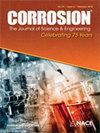Evaluation of corrosion and erosion–corrosion behavior of X65 pipeline steel in flowing CO2-saturated electrolyte
IF 1.1
4区 材料科学
Q4 MATERIALS SCIENCE, MULTIDISCIPLINARY
引用次数: 0
Abstract
In this study, the corrosion and erosion–corrosion behaviors of X65 pipeline steel in the flowing CO2-saturated electrolyte were electrochemically studied using a rotation disc system. The results showed that the accumulation of the Fe3C layer in the electrolyte without sand particles enhanced the cathodic reaction, increasing the corrosion rate. The increase in flow velocity facilitated the rapid accumulation of a thick Fe3C layer, which linearly increased the corrosion rate with increasing rotation speed. The sand impacts removed the corrosion product layer and broke the exposed Fe3C network, resulting in a negative synergy of erosion-enhanced corrosion. The erosion–corrosion negatively affected ferrites compared with the pearlites in an electrolyte containing sand due to the weaker erosion resistance.X65管线钢在流动的CO2饱和电解质中的腐蚀和侵蚀-腐蚀行为评价
在本研究中,使用旋转圆盘系统研究了X65管道钢在流动的co2饱和电解质中的腐蚀和冲蚀行为。结果表明:在无砂颗粒的电解液中,Fe3C层的积累增强了阴极反应,加快了腐蚀速率;流速的增加促进了Fe3C厚层的快速积累,随着转速的增加腐蚀速率呈线性增加。砂的冲击使腐蚀产物层消失,破坏了暴露在外的Fe3C网络,导致了侵蚀增强腐蚀的负协同作用。与珠光体相比,铁素体在含砂电解液中具有较弱的抗冲蚀性。
本文章由计算机程序翻译,如有差异,请以英文原文为准。
求助全文
约1分钟内获得全文
求助全文
来源期刊

Corrosion
MATERIALS SCIENCE, MULTIDISCIPLINARY-METALLURGY & METALLURGICAL ENGINEERING
CiteScore
2.80
自引率
12.50%
发文量
97
审稿时长
3 months
期刊介绍:
CORROSION is the premier research journal featuring peer-reviewed technical articles from the world’s top researchers and provides a permanent record of progress in the science and technology of corrosion prevention and control. The scope of the journal includes the latest developments in areas of corrosion metallurgy, mechanisms, predictors, cracking (sulfide stress, stress corrosion, hydrogen-induced), passivation, and CO2 corrosion.
70+ years and over 7,100 peer-reviewed articles with advances in corrosion science and engineering have been published in CORROSION. The journal publishes seven article types – original articles, invited critical reviews, technical notes, corrosion communications fast-tracked for rapid publication, special research topic issues, research letters of yearly annual conference student poster sessions, and scientific investigations of field corrosion processes. CORROSION, the Journal of Science and Engineering, serves as an important communication platform for academics, researchers, technical libraries, and universities.
Articles considered for CORROSION should have significant permanent value and should accomplish at least one of the following objectives:
• Contribute awareness of corrosion phenomena,
• Advance understanding of fundamental process, and/or
• Further the knowledge of techniques and practices used to reduce corrosion.
 求助内容:
求助内容: 应助结果提醒方式:
应助结果提醒方式:


